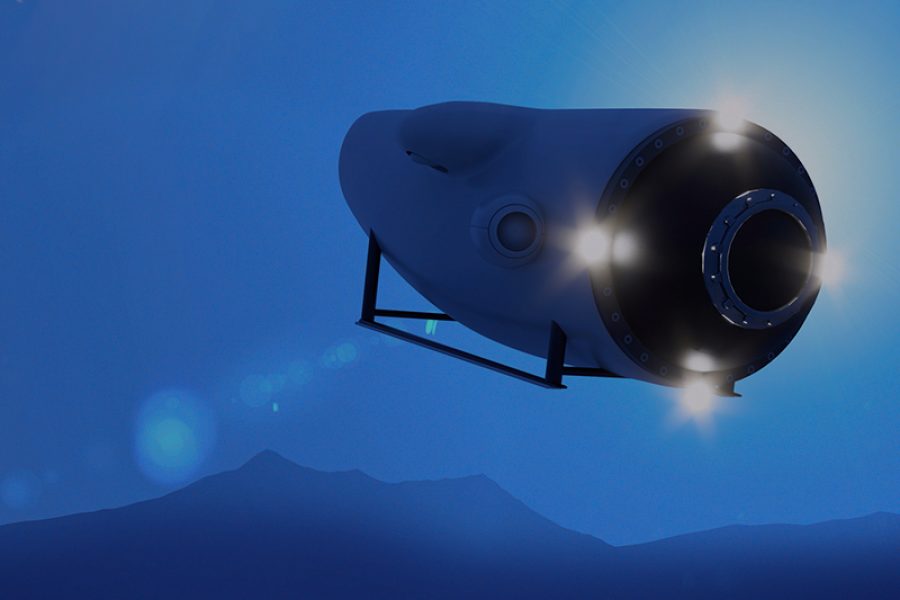(Note: PRI senior fellow Steve Smith, a former Coast Guardsman and merchant mariner, shares his thoughts on last week’s Titan submarine tragedy.)
Some went out on the sea in ships; they were merchants on the mighty waters.
They saw the works of the Lord, his wonderful deeds in the deep.
For he spoke and stirred up a tempest that lifted high the waves.
They mounted up to the heavens and went down to the depths; in their peril their courage melted away.
Psalm 107: 23–26
On Thursday morning, searchers found the wreckage of the Titan submersible that ended four days of speculation as to it and its crew and passengers’ fate. Much of the coverage has focused on the nature of the expedition, its necessity, risk factors and, according to some, the profit driven motivation of its designers and operator OceanGate.
Considerable rescue effort has been made on their behalf and that has come at a significant financial cost. Were the crew of the Titan deserving of that effort?
Legally, the cost of search and rescue at sea is borne by the involved governments as well as ancient and well-established maritime law that requires any ships in the vicinity who can render aid, to do so. Few people except mariners who have been there fully appreciate how massive our oceans are and how difficult rescue can be. The search area was the size of the state of Connecticut, and Titan was a mere 22 feet long. That area alone is almost unimaginable considering only one of the possible locations of the Titan was on the surface. Searchers also had 13,000 feet of water below to also search.
From both a legal and ethical standpoint, the crew of the Titan were no different than a sinking cruise ship or a lost kayaker. Any and all efforts and reasonable risk must be taken to recover those in peril. There’s a saying from the US Lifesaving Service which is now the Coast Guard – “You have to go out, but you don’t have to come back.”
Some harsh critics posts and comments in national publications and media have suggested that they knew the risks and deserved no rescue. The more cruel do not deserve mention here.
Have we come to the point where any and all human activity is evaluated on an immediate cost benefit analysis?
Americans as a people may be the most obvious recipients of the blessings of exploration as any people on the planet. Before exploration, America was a blank spot. Early cartographers assumed that nothing lay between Europe and China. While the Vikings stumbled upon northern Canada 400 years before Columbus, they were unable to penetrate further south or inland to properly investigate and understand what they had found, much less report their “discovery” to the rest of Europe. And every student in America knows that Columbus sought a new route to “the Indies” – not America – and we have been improperly identifying the peoples of the “new world” as such ever since. Columbus was not a very good sailor and probably a worse navigator, but his accidental “discovery” changed the world – not like techies like to boast – he truly changed the world in profound and irrevocable ways.
Virtually every American whether they reside in the United States or Canada, Columbia or Brazil – until the advent of the jet age – arrived here on a ship. Early ships initially sailed blind and later followed charts and data, if they had them, that were painstakingly drafted by hand using the most rudimentary devices by today’s standards. Accurate nautical charts were the prized possessions of nations and were held with the same secrecy as today’s most precious military and national-security secrets.
Many early sailors and passengers paid with their lives as voyages ended on the rocks or the deeps when their ships were destroyed by wind and waves of a magnitude that even today imperil the largest ships ever made.
Once here, those sailors, immigrants, and explorers began seeking new destinies as they pushed westward. Their routes were blazed by explorers and the people who financed their dreams. Columbus had Queen Isabella, Magellan the Portuguese crown, and Lewis and Clark had Jefferson. Those that followed used maps that identified trails that are iconic in American lore. The Oregon, California, Mormon, and Santa Fe. Where would we be if we had clung timidly to the coast? We’d be no better than the Vikings who squandered their discovery 400 years before Columbus waiting to be bested by braver people.
Americans have traveled to the poles, were the first to fly, the first to the moon, and are amongst just three countries that routinely fly astronauts to space. Our telescopes and research craft are probing the edges of our solar system and beyond.
And yet, we know more about the surface of the moon than we do our own oceans despite centuries of oceanic exploration – while the space age is just 65 years old. Moreover, there are more satellites than there are submarines – much less deep ocean research submarines, and the number of known people who have descended to 12,000 feet and deeper is probably fewer than have traveled to space.
The passengers and crew aboard Titan are very much part of our intrepid history. Yes, they were rich, but so were the financiers of other expeditions. And while the cost of the search for what we now know as another in our history of maritime disasters is high – the economic and benefits to science of exploration may be beyond computation and in fact, integral to our survival. Who’s to know what secrets lie in the deep? We certainly don’t…yet.
Steve Smith is a senior fellow in urban studies at the Pacific Research Institute, and is the author of the new PRI study on California’s growing crime trend, “Paradise Lost.”


